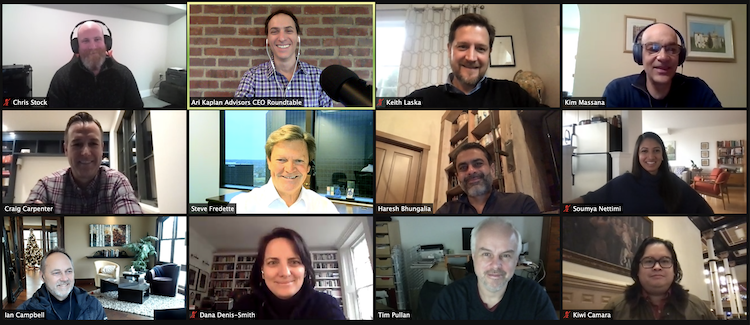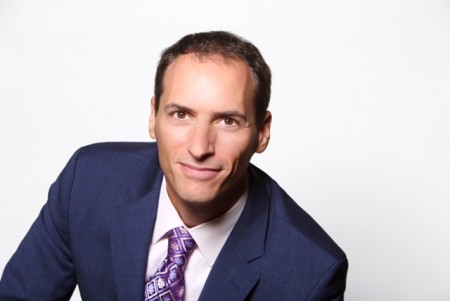CEO roundtable with Ari Kaplan: Lessons learned, silver linings and the road ahead

Ari Kaplan talks with his CEO roundtable.
One of the initiatives that Ari Kaplan Advisors launched in 2020 was a periodic Zoom-based CEO roundtable to discuss trends, challenges and objectives with market leaders.
During the fifth and final conversation of the year, Ari Kaplan reviewed lessons learned, silver linings and the road ahead with:
• Haresh Bhungalia, CEO of Casepoint
• Kiwi Camara, CEO of Disco
• Ian Campbell, CEO of iConect
• Craig Carpenter, CEO of X1
• Dana Denis-Smith, CEO of Obelisk Support
• Steve Fredette, CEO of the BarBri Group
• Keith Laska, CEO of Hanzo
• Kim Massana, CEO, Neota Logic
• Soumya Nettimi, CEO of ASG Legal Tech
• Tim Pullan, CEO of ThoughtRiver
• Chris Stock, CEO of PCLaw/Time Matters
Ari Kaplan: What did you learn about your business in 2020?
Chris Stock: We learned that our business in particular is incredibly resilient, even through this pandemic, and a key reason for that is having great employees that we’ve empowered over the years to make good decisions and to be able to do that without seeking out permission to do so. We also have an adaptable customer base. Lawyers will survive anything because there will always be a need for lawyers, and even if their area of law is running quite slow, we know that it’s easy for lawyers to pivot when they need to. They did it in 2008, they’re doing it again now, and they’ll do it again in the future when they need to. Lastly, we’ve discovered that working from home has really brought teams together. When you’re running a business with multiple offices and teams around the country, quite often there can be a divide between them. That’s disappeared while we’ve been working from home. It is one company and one team, regardless of where we are geographically located.
Steve Fredette: It is amazing how resilient teams can be. Our business was also adaptable to an ever changing bar exam schedule. I would echo, appreciating the team. Our staff was incredible in how they put the clients first. Even if they had challenges of their own throughout the year, clients always came first, which is amazing.
Ian Campbell: I think the upside and the downside to working from home is that the computer is always on, and that gets a little grating after a while. People did have a hard time turning it off at 5 o’clock, which is something that is a direct result of the pandemic. That said, now, we all have visibility into more of the personal lives of our staff, and I think it’s given us a chance to get to know everybody a little bit much more.
Kim Massana: It has been particularly tough for new hires. Those that were established have done well. The trust and relationships were there, but it’s been a little bit tougher this year for new people. I think that we have to make more of an effort to bring them up to speed and find ways for them to go to the water cooler and feel part of our team. We have been growing quite a bit, and that has been more of a challenge.
Tim Pullan: We’ve worked very well remotely, and it was pretty seamless, but we are leveraging those existing relationships. Although we don’t want to force people to come into the office on a nine to five, Monday to Friday, that face to face collaboration is something that a lot of people have missed, and it’s a different cadence to being on the screen. So we’ve gone through it, but we will be spending a bit of money on offices next year, without a doubt.
Dana Denis-Smith: I think I’ve learned about how innovative and imaginative my team is. One of the things we did was to spin out our technology and build a new product out of it, with a government grant, which was really fantastic. We know how to work remotely as that’s what we’ve done from day one. The other thing I’ve learned is the danger for women, if you’re not looking out for them. They will reduce their hours, and you can lose their talent. I have a lot of women on my team who ended up being in the driver’s seat for parenting and homeschooling. Some had to reduce hours, and I had to be really aware of it and reassure them. Knowing that these people are under severe pressure at home and obviously at work is critical.
Haresh Bhungalia: I think we’ve all learned that we have access to talent globally now. In the past, if I was recruiting someone for our senior leadership team, I wanted them to be in the geographic area of our office. I wanted them to come into the office every day. Now, my horizons have opened up to hiring someone from Silicon Valley, New York or Boston, for example. I think it’s really going to accelerate how our organizations function now that we have access to highly skilled individuals nationally and globally.
 Ari Kaplan. Photo by Lauren Hillary.
Ari Kaplan. Photo by Lauren Hillary.
Ari Kaplan: This CEO roundtable is a silver lining that I’m not sure would have occurred but for the pandemic. What is your silver lining?
Soumya Nettimi: We have four offices across the country, and the biggest silver lining for us as a team has been people coming together in a way that was just broken down by office barriers or product barriers. As we end this year, it is incredible to sit here and see our team closer than ever in a period that has been so hard and where people have not seen each other for nine months. Still, I do want to get back to the office and have space for brainstorming, where you’re not on the screen all the time.
Craig Carpenter: When you have a really diversified customer base, both geographically and then by vertical, it could be challenging to add more of them because they’re just so distributed, but in the pandemic, we had some geographies that just hibernated for three, six or nine months. Then we had others that did not, and they really picked up the slack. For example, the public sector did better than the travel vertical. I really grew to appreciate that diversity because we leaned on it this year.
Keith Laska: There has always this veneer between corporate and private life, where you hide certain elements of your personal details. That became impossible during this crisis and in a way, knowing more about each individual in the company and understanding their personal challenges has been eye-opening for me as a manager. There has also been an injection of maturity where individuals have the ability to do what they want, so if they don’t want to work between noon and 2, they don’t need to work during the period. That level of flexibility has been significant, both on the employee side and for our customer. That flexibility and maturity is probably something that is going to stick with us for some time.
Kim Massana: Our silver lining from a business perspective has been that clients have become very comfortable engaging in the whole buying journey digitally.
Kiwi Camara: I used to make it a point to visit every sales territory once a quarter, which meant I was on the road about 70% of the time. Now, you can pack in New York, Chicago, LA and San Francisco in four hours by Zoom, which has been transformative. But I basically believe in the return to pretty close to the old way. I am eager to get back on the road, and my sales managers are eager to, as well. Zoom is a lot better than I would have guessed; I still think the office is much better, especially for junior and mid-level professionals learning skills outside of their specific roles. From a long-term view, it is important to get people back to the office to the way it was.
Craig Carpenter: I think it’s going to evolve, and there is going to at least be a monthly get together, but I don’t think the practice of everyone being in the office every day will come back.
Chris Stock: We are adopting a hybrid scenario, looking at reducing footprints where we can, and offering more collaborative areas once we can all get together. I really miss those coffee and water cooler discussions. Doing that from home is more difficult, and I don’t know that anybody has cracked the magic line of code for that yet as to how we do it properly or remotely. I also feel that difficult discussions with employees and clients are better done in person and a lot more difficult over Zoom.
Kim Massana: We are considering which offices to open, which to close and which to convert to hoteling, so there are a lot of options. It is, however, difficult to plan because different regions are at different stages of the pandemic. In Australia, for example, we are going back to the office.
Dana Denis-Smith: There is a very different perspective that men and women have in this crisis. We have to step back and reimagine the workplace to fit everybody. One of the most amazing changes that has come out of this pandemic is the opportunities we were able to create for disabled people, as they can work from anywhere. We have to build a workplace that is truly inclusive going forward, as we have a leadership problem across the legal sector that is not inclusive of a lot of people. I really hope from this crisis, the silver lining will be an innovative approach to working that applies to everyone, including those that cannot travel or commute, and like me, have to co-work with a young family.
Ari Kaplan: What new skills are in highest demand?
Steve Fredette: It is not as much a skill as it is an attitude. It is the soft skills. You really need to have positive, self-motivated and engaging interpersonal skills and awareness of what someone might be feeling or thinking in a Zoom meeting or on Teams. That emotional intelligence is really important. As I look for new leaders, I want to see experience managing remotely.
Soumya Nettimi: We have called Zoom the great equalizer because all of a sudden, every person is the same-sized box on every call. We have also noticed people speaking up in meetings, who would never speak up in an in-person setting. I feel like we have a lot more equal participation in our company than we did before. It could just be us advancing as a company, but I do think part of it is due to working in a virtual world.
Ian Campbell: We’ve learned that some people, such as programmers, do very well at home. The brainstorming, however, is really tough. We also had our support team at home on Zoom taking calls that were being rerouted from the office, but they did not operate well in isolation.
Ari Kaplan: How do you think your leadership style will change moving forward?
Tim Pullan: In the main, it is about trusting your people to just get on with the job. The pandemic has forced me to change my leadership style into one that is far more focused on communicating the objectives and strategy than removing myself a bit more from the detail. I’m still involved, but I think people genuinely appreciate the empowerment.
Kiwi Camara: I worry that we are at peak reaction right now where we think everything is going to change, including all of the lessons we have learned over 50 years about how to build great high-growth businesses. I have worried sometimes that we are going to throw the baby out with the bathwater. Instead, let’s to the other end with the vaccine and make it a gradual process because we will find, as we always do, a happy medium, which is the right answer.
Keith Laska: When we live through these crises, we believe it’s the end-all, be-all, and everything is going to change from this point forward, but many of us experienced the dot-com bubble and the financial crisis. There is a difference between a moment of transformational change and one that has been influenced as the result of an event. I do believe people are going to be working from home more often, which will produce more flexibility and understanding. EQ will be just as important IQ in business. But we will get past this, and I wouldn’t be surprised if we continued some of the habits we had back in January and February 2020.
Haresh Bhungalia: We have had a lot of conversations about diversity and inclusion to figure out how we as an organization can be supportive and involved and to address our moral responsibility.
Ari Kaplan: What will clients expect in 2021 and beyond?
Soumya Nettimi: Crises like this just tend to accelerate trends that are already happening. You think the world is going to flip upside down, but when you analyze what happened in 2020, you see that we experienced the trends we were seeing for the past five years but in a compressed and accelerated fashion. Lawyers have also decided they need to adopt technology to survive. We are excited to see more firms that were stuck in the world of 20 years ago looking to change and realizing that they need to run their law firms like businesses in order thrive in this new world.
Dana Denis-Smith: “Digital first” is the phrase for next year. Many realized that it worked really well for them. In fact, some of the results from law firms are pretty extraordinary. There seems to be much more interest in digital and dashboards and ensuring that leaders have visibility into underlying trends in their businesses. It is really exciting and finally we can say it’s here.
Craig Carpenter: We will need to ensure that our technology or services work in any kind of environment, specifically the hybrid format that many predict. We need tools and techniques that allow clients to be flexible.
Steve Fredette: It really took a pandemic to force the industry to embrace a virtual workplace and technology. We really have to understand our clients’ pain points and try to see around corners for them to lead them out of the woods. We deal with law firms and law schools, and I can tell you that Zoom classes for law professors are not a long-term strategy. We have to figure out a better way to reach students and deliver better education, which are opportunities for us.
Chris Stock: I think there was a generational difference, particularly from a technological perspective, and the pandemic has actually closed that gap. I think of my grandma, who is using Zoom now and never touched a computer before. That extends into the business world.
Ari Kaplan: What are you looking forward to in 2021?
Haresh Bhungalia: We will allocate [a] budget to bring our team together every quarter in a mini off-site because collaboration at the team level for strategic planning has been more challenging remotely.
Ian Campbell: There’s been a frustration I think all of us have felt with the fact that the goalposts keep moving. I’m looking forward to the goalposts being solidified, so that we all know what we’re shooting toward and we can make the appropriate decisions based on something that is a little more concrete.
Steve Fredette: Turning the page and understanding that uncertainty is our new norm. Now, you’ve just got to be more flexible in how you think about issues and adapt. There is no going back to what was. The goalposts are going to keep moving on us.
Chris Stock: Being able to work from home again, rather than home from work.
Listen to the complete interview at Reinventing Professionals.
Ari Kaplan regularly interviews leaders in the legal industry and in the broader professional services community to share perspective, highlight transformative change and introduce new technology at his blog and on iTunes.



